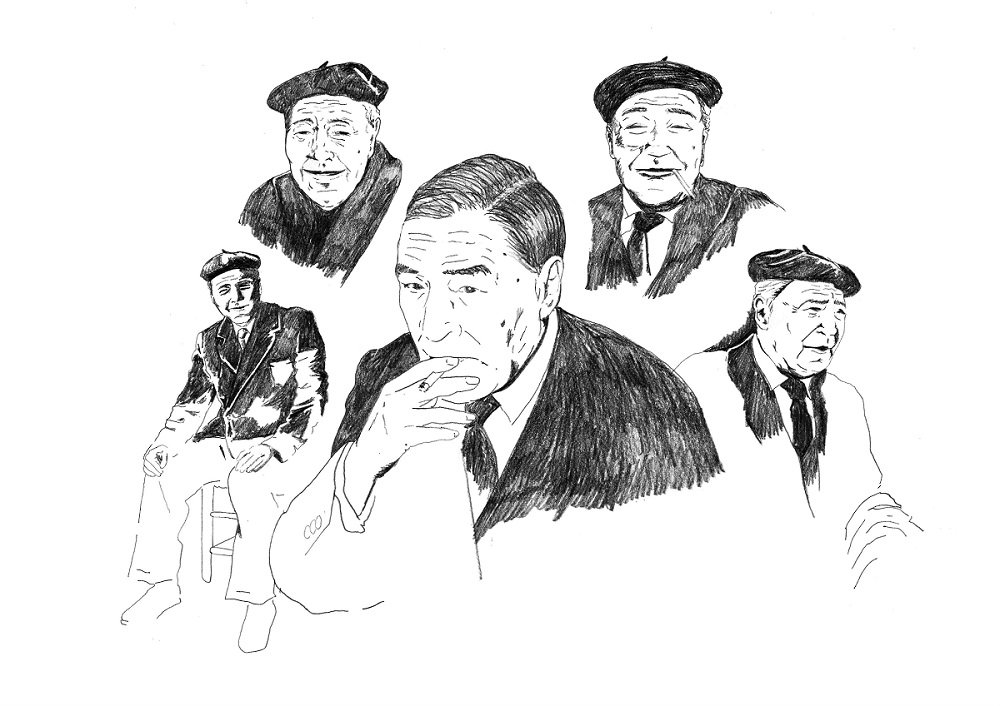Mr Pla, what is the point of the bourgeoisie?
One of the first duties of the liberal man is, in effect, to defend the country’s wealth against the omnipotent State, especially against a state led by a policy that has not precisely demonstrated a remarkably constructive capacity.
Is there a bourgeois ideal?
The bourgeois tends towards respectability. But on this there is one point to clarify. The intelligent bourgeois does not aspire to respectability for purely personal reasons; he aspires because of his profession, his knowledge, his métier. Achieving respectability is the ideal of the bourgeoisie.
A bourgeois spirit…
A true bourgeois cannot be defeatist.
A bourgeoisie for the nation?
Thus does he consider that love of country is as obvious and indisputable a thing as is political and economic liberalism, as competition in trade, as family and social respectability, as tolerance and political freedom, as the exercise of rights and duties.
Bourgeoisie means capitalism.
Capitalism is anarchic, as I believe, but humanly speaking it is effective and productive. Socialism is adequate but inefficient.
And the motherland?
Patriotism is a sentiment that has been abused so much and so dangerously, that it is perhaps not worth talking about or mentioning. It seems there must be general principles, intimately related to the tribe within which one exists, set above personal outbursts and whims. It is perfectly obvious. The moment patriotism fails, the phraseology of betrayal appears immediately. The traitor is the opposite of the patriot. In peacetime the contrast is muted.
What is your view of patriotism in Catalonia?
Many Catalans are interested in Catalonia, but they do not believe in it. This is quite the opposite of how they see religion and the afterlife: they believe in it, but they are not interested.
What power?
I shall always prefer a Catalonia led by our industrialists and traders, along with all their flaws, to being led by inept bureaucrats and puritanical Socialists, advocating false statistics. I am a supporter of individualism —a factor in every possible economy— but I would wish for a polite, well-educated and conversationalist individualism.
What are the Catalans like?
Catalonia is a land of erotics, adjusted by greed. It’s an appreciable form of national health.
And how do they coexist?
The country is very small: tiny. And precisely because it is so small, criticism has never been considered acceptable—not even the most usual. It is a country of praise, of systematic optimism. Never submit an objection, even if it is well grounded.
Do you believe in Catalan sentimentalism?
This country has always exercised sentimentalism, excessively.
But what about Catalan seny, sensibility?
Catalan sensibility is apparently a commercial, positive form of scepticism.
Defects?
The Catalan is caustic. Causticity is used above all against any form of facility —of execution. It annoys, it aggravates. What exasperates him most about others is what they do. Others are always imbeciles, but the most imbecilic are those who do things.
And geography?
The Catalan, unless proven otherwise, is an exaggerated cragsman who works on the plain with a cragsman’s ideas.
A small country?
Is Catalonia so small that it cannot stand, within the limits of its extension, a misguided man? What is more: is Catalonia so small that one is to hear how its most qualified representatives of culture expel a Catalan in some form of grotesque, plebeian inquisition, an Africanism never before seen? Patriotism is a very serious thing. It is one of the most serious things in the world. Those who serve it left, right, and centre do it poor service; those who use it to decapitate their unpleasant neighbours and to divide the citizens into good and bad, in the name of what culture and what civilization do they speak? What is civilization, in fact, but the elimination of the chauvinistic cannibal’s arguments in social and political behaviour?
How to do politics?
It’s just that politics is not only the art of empirical manipulation. It is the art of eternal elements and principles, geographic, traditional, and spiritual principles, which are undistinguishable.
Pact, deal-making…
In well-established countries, politics is the art of negotiation according to the conveniences of every moment. In our country, politics is a struggle —consider the last century and recall this one— and all the struggles among one and other end up badly and bloodily.
What brings about a civil war?
In countries at civil war and violent convulsions, difference works with the same cutting edge as a guillotine. Both sides appear separated by an uncrossable line. That’s why the words Talleyrand wrote in his Mémoires, speaking of himself, are accurate: “Treason is a matter of dates.” And I would add: “And of geographic location.” Those of us who lived through the last civil war know that well enough.
So…
Politics is the art of avoiding civil war.
And after a civil war?
One of the most curious though perfectly predictable effects of the last civil war was the immersion of a huge number of people into a dark shadow zone, not in comparison with the immediately preceding years, but with the preceding centuries. At a certain time it seemed (by measure of the sophistication of the propaganda) as if we were contemporaries of the late medieval Spanish Catholic Monarchs, and that we might at any time see them walking up the street. A kind of historical mirage came about, the resurrection of a fake world, the appearance of a fictitious light ordained to create the appearance of an immediate reality destined to infiltrate the people’s spirit with a new conception of the world.
What is culture amongst such brutishness?
I have lived through a time during which were committed the worst cruelties, the most dramatic savagery. It was, at the same time, an age in which more books were published and read than ever. Thus, if culture is books, and the contemporary savagery was so enormous, books do not make culture. They doubtless make madness grow. Culture has nothing to do with books: culture is a certain state of mind, understanding, tolerance, hospitality. I have known a lot of illiterates or half-literates that are incomparably more cultivated—more cultural—than so many conspiring, fanatical, dangerous intellectuals, whom I have also known. However, when a certain manner of being is reinforced by the knowledge in a few books, thence appears a well-made man.
What political ideas exasperate you most?
I understand all social utopias, all ideas, whichever they may be. Anarchism, however, has always produced a feeling of physical discomfort, disagreeable disorder —going to bed and finding that it has not yet been made.
What makes a country great?
Countries are not great because they are large or small. Their substance depends on the quality of the people that live there. Switzerland is a tiny country, objectively poor, but great. It is a country that has achieved universal trust due to its intrinsic location. Small countries are the only ones that fit in people’s minds. They can take care of the whole and of the parts: they can, in so many ways, reach stupendous perfection.
And what is the circumstance of Spain?
The whole problem consists of judging what future moderation has in Spain.
History does not progress…
History is a huge effort that leads to no solution at all. History is the description of the plant and animal world. History is Darwin.
Mr Pla, you are taken as a total individualist…
Individualism or decadence.
What is the writer’s responsibility?
I do not believe a writer carries any exclusive personal message. That idea is the latest form of literary romanticism, the most pretentious and childish thing that literary romanticism has produced. What I believe, on the other hand, is that a writer has a total responsibility before the times he has lived. The first duty of a writer is to observe, to narrate, to chronicle the times he lives. This is infinitely more important than the useless, sterile attempts to reach a wild, primitive originality.
And writing is living?
Writing has created within my intimate and spontaneous self a strange person whom I myself often do not understand, nor what it has to do with me, such are the many differences I have found. By virtue of this split, it turns out that if I, by nature, am a weak and miserable being, when I have a pen in my hand I become Dionysian and offensive, I enter a state of silent exaltation and I am able to maintain opposition, to the final consequences.
Do you believe culture to be progress?
In any case, literature seems to be the great remedy to boredom. People read because they are bored. This means, in sum, that writers will always make a living —more or less, of course. Sociologists say people read more and more every day. Culture progresses, it advances. No. What progresses and advances is boredom.
What kind of writer did you want to become?
I have always done what seemed to me to be most urgent: easy, clear, intelligible, up-to-date literature. I started on a vulgar literary path, but without pornography, gossip or anarchy, always in favour of a society full of the defects they wanted, but which is the most racial. I have often erred, certainly, but I cannot do anything about it: it is normal. I have been one of the most blasted writers in this country. It matters not. I have blasted myself much more.
Is literature possible without prose?
Formal genius can only appear in that literature in which expressive clarity and comfort are a unanimously intangible state.
Is writing a form of order?
I raise the flag of rule against chaos, architecture against geology, grammar against confusion, of the Holy Family against errant, unleashed Bohemia. My idea is that these things cannot be moved out of focus by art, and when the laws of human life are broken in favour of cosmic life, there is no art possible, even if large secretions of physiology may be produced, and it goes without saying of course, pleasurable secretions of physiology.
And novels?
In life, plots do not arise other than through rare accident, and therefore, novels with a plot, rather than reflecting on life, do no more than arbitrate a form of contrivance.
What egotism is possible?
I do not defend the egotism of irresponsibility. I defend defensible egotism, making abstraction of the deadweight of the age.
Landscape and literature…
The landscape makes you understand literature, because literature is the memory of landscape in time.
Landscape and civilisation…
Contemplating the lay of the vineyards, with the paths of trees, the white and toasted houses covered in leaves, the wells with their arches, the dusty, reddish stream bed, with dry white clothes, the blue stain of the sea and the rose of the beach, the churches of the land, the Catalan bell towers, the colour of icing sugar coated ensaïmada pastries, a feeling of having your head on your shoulders, it estranges all imagery of monsters, all metaphysical vision, that you come to see life and the rush of all human forms under the fold of labour and the ordered concern for the civilisations of the past, of the considerable, obscure ambition of the forebears. And civilization is nothing more than this: to mentally reduce a piece of monstrous earth to the old curve of a tender almond.
A recommendable menu?
If every you find yourself one winter day in New York, I would suggest the following menu for lunch: a dozen and a half oysters, and a charcoal grilled beef steak. It is a perspective you can be sure of, particularly when done with ingredients of the greatest simplicity. The United States is not precisely a country of sauces or any flim-flam like that. If you do what I am modestly suggesting, it must be accompanied by an expensive French or Italian wine, you’ll come out of the restaurant full of strength and vitality and you’ll be able to say something positive to those who claim that one eats poorly there. Once the lunch itself is done, order a real English cheese, an Italian coffee and a Burgundy marc or a grappa.
An aperitif…
There are two magnificent aperitifs in France, two wines: Champagne brut nature and the Blanc de Blanc from the Loire, which is a small, slightly misty, hazy wine, which is excellent.
Why are you a conservative?
Only a man who at every moment saves, conserves, improves, the greatest possible number of things, affections, assurances, qualities, is worthy of being called rational. Nature destroys. In a spirit of encapsulation, what is known as culture is essentially memory and experience —an effort of memory and experience in the indescribable vagueness of life— has the essential purpose of maintaining. There cannot be any form of civilisation without a prior manner of conservation.
Fixing the world…
I have often seen the great criminals of our time with my own eyes: Mussolini (in Milan and Rome), Hitler (in Berlin and Nuremberg), Trotsky (once in Paris). I have never seen Stalin, who was perhaps the greatest criminal of all. They were all saviours who wanted to fix the world, and the more they wanted to fix it, the more they destroyed, hurt and assassinated it.
Is civilisation memory?
In his natural state, man has no memory: he is a creature that lives passively before nature. Civilised man aspires to having at least some memory.
Civilisation and destruction?
Speaking in absolutely general terms, what we call civilisation seeks to be, suspiciously, an effort to delay as far as possible, the ineluctable destruction of things, in order to build others that make existence more bearable. Faced with Nature, that carries in its very root the devastation of anything that does not conform to its blind instincts, the enterprise of civilisation is an elevated, magnificent, heroic enterprise. But how weak is its force…! It is a small artifice, based on astuteness, prudence, tenacity, before Megazou, the imposing Cosmic Beast.
In short, the norm, be formal.
Our civilisation means choosing at all times between Nature and Form. Being formal is the opposite of being natural. More natural than living hygienically is to live in any other way. More natural than to shave is not to shave. More natural than brushing your teeth is not to brush them. More natural than a sonnet is the free and candid verse. More natural than making a living from a continued, constant, modest job is to place yourself at the crossroads and do whatever may present itself. More natural than building is to happily destroy.
The other face of civilisation?
Frustration, however, is exactly the same as civilisation. You are frustrated people because you are civilised people. To summarise, we might say frustration equals civilisation.
The importance of memory…
But memory is a double-edged blade: if one edge keeps us in illusory fixation in the face of time, the other, while it confirms the changes at successive moments, exacerbates the pain of the flight of hours. It is the memory of the bright past hours that makes us see the precariousness of the present and suggests the empty darkness of what is to come.
Lasting, above all…
The human being has a ruthless, blind capacity of destroying himself and taking apart everything that has been built with the ambition to last. Man aspires to last in what he does, but at the same time he destroys it. That is why every human being that adds to his frivolous and unconscious instinct of destruction a reflective capacity of destruction —wholly revolutionary— is a savage. Pointless, useless, anachronistic things fall on their own accord, like ripe, rotten fruit.
And the family remains?
The family is an institution that exists. It is a mysterious, sacred, run down accoutrement.
Living memory?
Vitality is the key to everything. If I had enough, I’m sure that with pen in hand, maybe I would do something. Vitality is more important than intelligence. Memory is probably the highest form of intellectual vitality.
A landscape, Mr Pla.
The landscapes that I like most are decidedly the undulating ones, with cafes, restaurants, savings banks and fine, kind ladies.
An instant…
I would sometimes see the tiny, dark, bluff bird pecking at a cherry, eagerly swallowing the flesh, anxiously singing with a liquid, sensual joy, as if overcome with feverishness.
For a more formal country?
I would have liked to have lived in a constituted nation and in a perfectly formed, slightly hypocritical, tolerant, pleasant society. I think the only way to prevent people from brawling is to apply a touch of hypocrisy.
How do you feel the passing of time?
Time destroys everything and destroys us. The hours fly by. The years are not forgiving.
Is writing defending an era?
I sail against the corruption of the current. I am not a product of my time; I am a product against my time.
And travelling?
Reaching an undiscovered city, going down to the hotel, taking a bath, dressing and going out into the streets at random, gawping as a frank outsider, has been one of the most pleasant things in life.
Fleeing from home?
In this country, I could not be a de-naturalised defector, but a melancholy one: that is the drama of it.
The prodigal son.
Returning is sad. Leaving again must be intolerable.
Is writing a motherland?
Sometimes, at night, especially in the very early morn, I wake up in bed, fascinated by the darkness, and I approach the fireplace, with its dying embers. I start writing. Nothing. In absolute silence. Sometimes I hear, in the distance, far off, a dog’s broken bark. I like to look though the window, at the darkness that remains and the very first light, so pale, pinks and yellows enjoin the day.



















